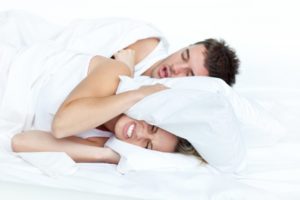Your Dentist Says Your Snoring Could be a Sign of Sleep Apnea
August 11, 2018
 Are you known to wake up the whole neighborhood when you sleep? Your local dentist says that if you frequently and loudly snore, it could be the result of sleep apnea, a serious condition that’s unfortunately on the rise. Learn details about this condition and the treatment methods available to treat it as you continue reading.
Are you known to wake up the whole neighborhood when you sleep? Your local dentist says that if you frequently and loudly snore, it could be the result of sleep apnea, a serious condition that’s unfortunately on the rise. Learn details about this condition and the treatment methods available to treat it as you continue reading.
What is Sleep Apnea?
Sleep apnea is a condition that causes you to wake up frequently throughout the night due to repeated air blockage. The most common type is obstructed sleep apnea, which involves the partial blockage of your airway due to your throat muscles relaxing while you sleep.
This can lead to two things happening:
- Loud Snoring – As the restricted air passes through your airway, a vibration is caused from the partially collapsed throat muscles, which results in loud snoring.
- The Alarm Clock – Your body has several built-in safety mechanisms that act like an alarm clock. One of them involves a signal that’s sent from your brain throughout your nervous system when there is a stoppage in breathing, which alerts you to awaken. This can happen repeatedly throughout the night, leaving you feeling tired and lethargic the next day.
Other Signs of Sleep Apnea
Along with always feeling tired and snoring loudly, here are some of the other warning signs of sleep apnea to be on the lookout for:
- Irritability
- Depression
- Throat Soreness
- Morning Headaches
- Inability to Concentrate
If you notice any of these symptoms, you should seek help immediately.
How to Treat Sleep Apnea
One of the more common methods for treating sleep apnea is with a CPAP machine. You’ll wear a mask that delivers a constant supply of oxygen via a special hose that’s attached to a machine.
For some people, though, the CPAP machine is too loud and cumbersome. Thankfully, there is an alternative – a portable appliance that is worn at night. It forces the jaw forward just enough to keep the vital airway open, and there are no wires, tubes or loud noises to endure.
Although having a custom oral appliance fabricated is highly effective, you can also implement some nighttime habits that will help you relax better and transition into uninterrupted sleep.
Consider these ideas:
- Start attending yoga classes.
- Implement a new exercise program.
- Practice breathing techniques to relax your body.
- Read a few pages in a book before retiring for bed.
The first step to getting the help you need for sleep apnea is to reach out to both your general doctor and dentist. You may be subject to a sleep test that will help in determining whether you actually have sleep apnea so the proper plan can be developed.
If you’re barely making it through each day and feel like you’re running on fumes, then it can be detrimental to your oral and overall health. So when you notice any of the above symptoms, be sure to reach out to get the help you need.
About the Author
Dr. David George Banda earned his dental degree from the University of Michigan in 1986 and has since remained an avid learner. He combines his advanced training and years of experience to help patients get the sleep they need at Cranbrook Dental Group, and Dr. Banda can be reached for more information through his website.
No Comments
No comments yet.
RSS feed for comments on this post.
Sorry, the comment form is closed at this time.










